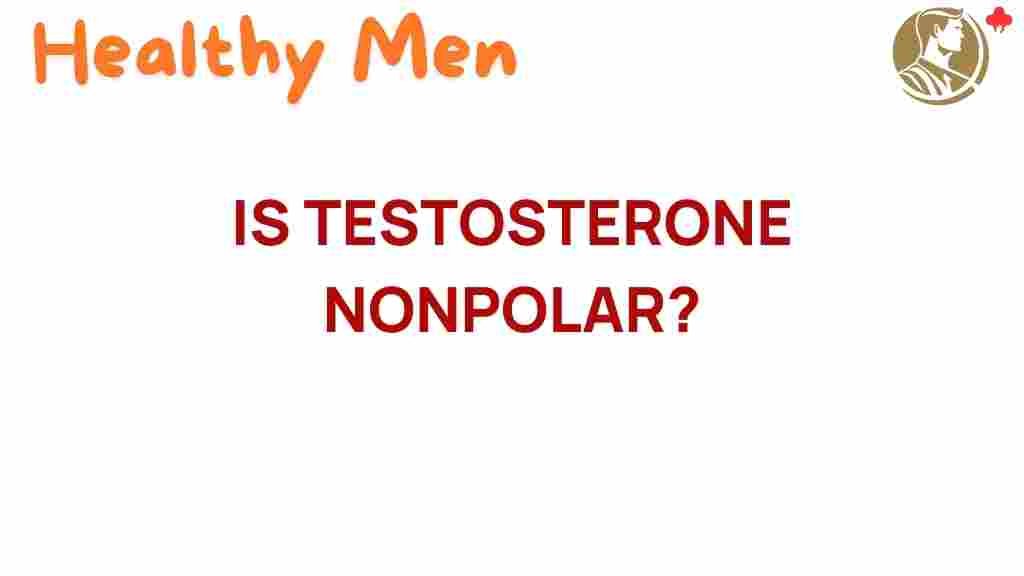Unraveling the Mystery: Is Testosterone Nonpolar?
Testosterone is one of the most well-known hormones, playing a crucial role in male health and development. However, the question of whether testosterone is nonpolar relates not only to its biological functions but also to its molecular structure and interactions within the body. In this article, we will explore the biochemistry of testosterone, its classification as a hormone, and whether it can be considered nonpolar. Understanding this will provide insights into the broader implications for health and science.
Understanding Testosterone
Testosterone, a steroid hormone, is primarily produced in the testes in men and ovaries in women, with small amounts produced in the adrenal glands. It is vital for the development of male physical characteristics and the maintenance of male reproductive tissues. The hormone also influences a range of physiological processes, including:
- Muscle and bone mass
- Fat distribution
- Red blood cell production
- Libido and sexual function
In women, testosterone contributes to ovarian function and bone density. Its levels can vary based on age, diet, and overall health. Understanding the molecular structure of testosterone helps us appreciate its role in the endocrine system.
The Molecular Structure of Testosterone
Testosterone is classified as a steroid hormone, which means it is derived from cholesterol. Its molecular formula is C19H26O2, consisting of four fused carbon rings. This specific structure plays a significant role in its function and solubility.
To determine whether testosterone is nonpolar, it’s essential to analyze its chemical composition. Nonpolar molecules typically have a symmetrical distribution of electrical charge, which means they do not mix well with water but can dissolve in oils and fats.
Is Testosterone Nonpolar?
Yes, testosterone is considered a nonpolar molecule. This classification arises from its molecular structure, which lacks significant electronegative atoms that would create polar bonds. Here’s how this impacts its behavior:
- Solubility: Testosterone is soluble in lipids (fats) but not in water. This characteristic allows it to easily cross cell membranes, which are primarily composed of lipid layers.
- Transport in the body: Because of its nonpolar nature, testosterone binds to carrier proteins in the blood, such as sex hormone-binding globulin (SHBG), to facilitate its transport throughout the body.
- Hormonal action: Testosterone interacts with androgen receptors in target tissues, leading to various physiological effects.
The Role of Nonpolar Molecules in the Endocrine System
The endocrine system is responsible for hormone production and regulation, and nonpolar hormones like testosterone play a critical role in this system. Here’s how nonpolar hormones, including testosterone, function:
- Cellular uptake: Nonpolar hormones can easily penetrate cell membranes, allowing them to bind to intracellular receptors.
- Gene expression: Upon binding to their receptors, nonpolar hormones can influence gene expression, leading to changes in protein synthesis that affect various bodily functions.
- Feedback mechanisms: The endocrine system relies on feedback loops to regulate hormone levels. Nonpolar hormones like testosterone are involved in these loops, ensuring balanced hormone production.
The Health Implications of Testosterone Levels
Understanding the nonpolar nature of testosterone is crucial for assessing its health implications. Testosterone levels can significantly impact health outcomes for both men and women:
Low Testosterone Levels
Low levels of testosterone can lead to various health issues, including:
- Reduced libido
- Decreased muscle mass and strength
- Increased body fat
- Fatigue and depression
These symptoms can affect overall quality of life and may require medical intervention.
High Testosterone Levels
Conversely, excessively high testosterone levels can also pose risks, such as:
- Increased aggression and mood swings
- Acne and skin issues
- Increased risk of cardiovascular problems
- Potential infertility issues
Monitoring testosterone levels is essential for maintaining optimal health. Regular check-ups and hormone level assessments can help identify any imbalances.
Step-by-Step Process to Assess Testosterone Levels
If you suspect an imbalance in testosterone levels, following a structured approach for assessment can be beneficial:
- Consult a Healthcare Provider: Schedule an appointment to discuss symptoms and concerns.
- Blood Test: Request a blood test to measure total and free testosterone levels, along with other relevant hormones.
- Review Results: Analyze the results with your healthcare provider to determine if levels are within the normal range.
- Consider Lifestyle Changes: Discuss potential lifestyle modifications, such as diet and exercise, to help manage testosterone levels.
- Follow-Up: Schedule follow-up appointments to monitor any changes and adjust treatment plans as necessary.
Troubleshooting Tips for Hormonal Imbalances
If you are experiencing symptoms related to testosterone levels, consider the following troubleshooting tips:
- Maintain a Balanced Diet: Focus on a diet rich in healthy fats, lean proteins, and whole grains.
- Exercise Regularly: Engage in both aerobic and strength-training exercises to promote hormonal balance.
- Manage Stress: Incorporate stress-reducing practices such as meditation, yoga, or deep-breathing exercises.
- Get Adequate Sleep: Aim for 7-9 hours of quality sleep each night to support overall hormonal health.
- Limit Alcohol Consumption: Reduce alcohol intake, as excessive consumption can negatively impact hormone levels.
Conclusion
In conclusion, testosterone is a vital hormone that plays a significant role in health and well-being. Its classification as a nonpolar molecule is essential for understanding its function within the endocrine system and its impact on various biological processes. By maintaining balanced testosterone levels and understanding its molecular properties, individuals can better manage their health. For further information on hormonal health, you can visit the National Institute of Health for comprehensive resources.
By unraveling the mystery of testosterone and its nonpolar nature, we gain valuable insights into biochemistry and health that can guide us toward better health outcomes.
For more detailed information on hormones and their functions, check out our article on the endocrine system and its key hormones.
This article is in the category Conditions and created by healthymen Team
